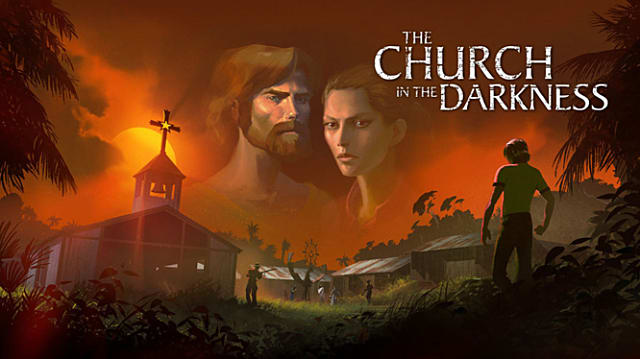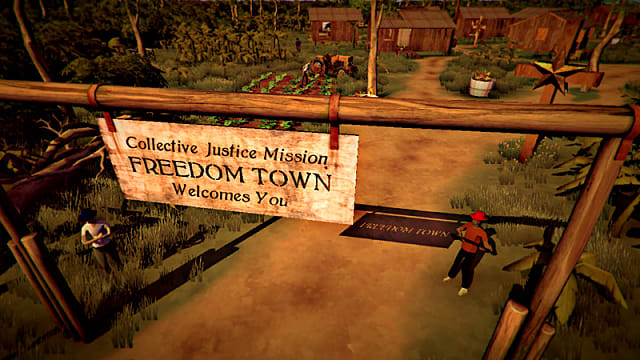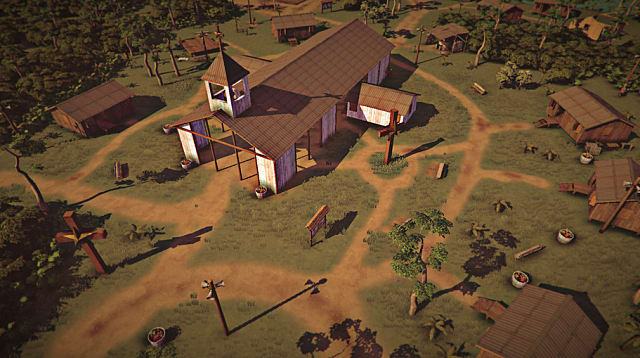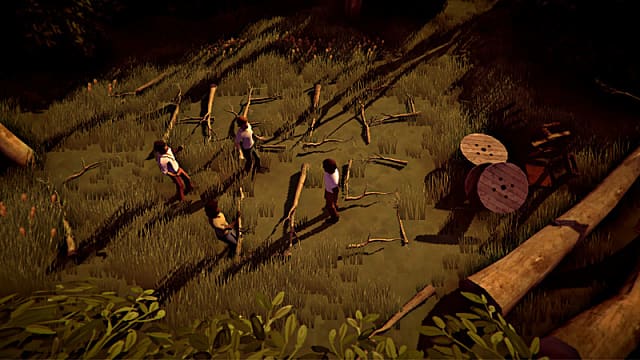

It's 1977.
At the behest of your sister, you're sent to the jungles of South America to search for your nephew Alex. He's in a community named Freedom Town, whose 500 or so people packed their bags amidst supposed persecution ten years prior and left the capitalist machine of the United States behind.
Whether a name like "Freedom Town" fills you with suspicion or hope when you arrive on the outskirts of the commune likely reveals part of your own worldview, and the best part of The Church in the Darkness is you'll be right and wrong at different times no matter your predisposition.
Sometimes Isaac and Rebecca Walker, the charismatic leaders of the Collective Justice Mission, will practice what they preach and exist as the open arms to all who search for a new way of life. Other times, their intentions, though perhaps once noble, have been trampled by years of paranoia, subversion, and in-fighting.
You've just stepped into a small, town-sized powder keg. This malleability is the greatest ambition of The Church in the Darkness, and it largely succeeds at fulfilling its promise.
Only God Can Judge Me
The Church in the Darkness is built on stealth first and foremost, and while it allows you to go louder and messier if you prefer — the same way many genre games do — it's often the wrong approach because you can easily end up the bad guy.
Cults rightfully have a bad reputation, but it's also true that we only tend to hear about the communities that end like Jonestown or Heaven's Gate. There are surely some communities that could be considered cults, but they live on without human rights violations and mass suicides, so they don't make the news.
Sometimes that's who the Collective Justice Mission is. Sometimes the Walkers truly are the loving, kindness-practicing leaders who just want to live a way of life that is incongruous from Cold War United States politics. Other times, the chorus of kumbaya never comes, because one or both of them are unhinged.
No matter which personalities you get for the Walkers on any given playthrough, the game masks who they really are and drip-feeds the reveal to you by way of dialogue, collectibles, and the leaders' temperament if or when they capture you.
There's a small number of other CJM members with whom you can interact and from whom you pick up side missions, and though their objective, like your own to find Alex, never changes, where you find them and where you'll find what they need changes with every playthrough.
There seem to be four major personality possibilities for the Walkers, but then those permutations have permutations that react to how you're playing. Even if you've deduced that the Walkers aren't worthy of praise or trust, you can still alter the course of how that playthrough ends based on what you've done to their people. Every interaction is a moral dilemma and even as the community members are mostly faceless zealots, the sense that you could light a figurative fuse in Freedom Town and cause more harm than would otherwise unfold presents an engaging utilitarian dilemma.
Do you knock out a guard knowing he'll awaken shortly or just kill him on the spot? Do you hide a body or flee the scene in a disguise? Do you rob a farmer for their food or sneak past and save them from that trauma? How will you manage your inventory when health and bullets are often so low?
The game constantly feels like it's doing the math and solving the equations you present in real-time, and that makes for over a dozen different endings, and you'll definitely have favorite finales — I know I do.
Working In Mysterious Ways
The top-down map is wide open but constructed in a maze-like manner because of the various treelines, buildings, and armed guards you'll have to circumnavigate. On easier difficulties, this is done using vision cones which can temporarily be spotted when the player crouches. On the highest difficulty, you're completely without them — and death is a one-shot kill away.
The four difficulty modes are well-balanced. A systems-heavy game like this, where so many variables are interacting at once, feels like the perfect backdrop for perfectionists to chase the most difficult playthroughs, like moving through Freedom Town and extracting Alex without anyone ever knowing you're there or doing so without being harmed on the way.
Completionists will also love filling out the game's endings page, where you can see which you've seen so far and on which difficulty you've seen them.
Maybe because the game is so ambitious, it doesn't quite hit the high mark it's going for, even as it admirably comes close. With so many permutations in play, enemy behaviors don't always logically continue from the data you've given the game. It can sometimes be really easy for guards to stop chasing you, even after they may have found several dead bodies. The game also doesn't have a sound mechanic that alerts nearby Freedom Towners of gunshots. Instead, it's all seemingly based on line of sight and vision cones.
It's consistent, at least, but dissatisfyingly unrealistic in this way.
Some parts of the UI also tend to get in the way by taking up too much of the screen and staying on screen longer than needed. As each playthrough will contain multiple objectives and side missions before you can escape with Alex (or not), confront the Walkers (or not), or expose the Collective Justice Mission (or not), time is often of the essence.
The game's way of sharing new information via large blocks of text can sometimes obstruct vision cones or enemy movements, too, leaving you at their mercy for a moment too long. On harder difficulties, this is especially problematic because it takes that vital autonomy out of your hands and nearly blindfolds you amid a host of trigger-happy gunmen where one shot erases it all.
Other times, some minor bugs get in the way, too, usually revolving around escorting your nephew. He's a reliable AI, don't worry about that, but sometimes interacting with him during your getaway can leave some extra UI stuck on the screen. I found a workaround to fix this, but it's obviously not supposed to happen.
Anyone for Kool-Aid?
While it's first and foremost a game driven by its well-defined but flexible gameplay elements, I found a lot of the narrative content compelling. Reading descriptions for collectibles is fun because they too change with the many versions of Freedom Town. But most of all, I was often stunned by the constant dronings over the speakers by Isaac and Rebecca Walker.
They make some really strong points about the United States' shortcomings and its bloody, terrible history as the richest country in the world built on the backs of slave labor. They recall the Stonewall Riots, mock the presidents of their time, and even come down particularly hard on my hometown of Boston.
The Walkers, even when they're at their most vile and violent, can still make uncomfortably strong arguments, at least for why Freedom Town was originally necessary.
Their public speeches like these serve as a constant reminder of how cults often reel in some of the smartest people in our society, not just our most outwardly vulnerable. We know this is true from history, and Church depicts this accurately and cleverly across the many versions of the charismatic leaders.
Pros:
- Ambitious, moving-parts story design mostly works and invites many playthroughs
- Compelling characters in the Walkers who beg philosophical questions in all iterations
- Collectibles done right
Cons
- UI issues get in the way, especially on higher difficulties
- Falls a bit shy of reacting realistically to all your decisions
The Church in the Darkness comes from a small team determined to toy with big ideas, both in story and in gameplay, and for the most part, it gets those elements right.
The employ of stealth as a self-measuring moral barometer is satisfying every single time, and the Walkers' soapboxing is unnervingly hard to argue against.
The game does show its constraints in some ways, but by and large, it's worth singing its praises. Hallelujah.
[Note: A copy of The Church in the Darkness was provided by Paranoid Productions for the purpose of this review.]



0 comments:
Post a Comment